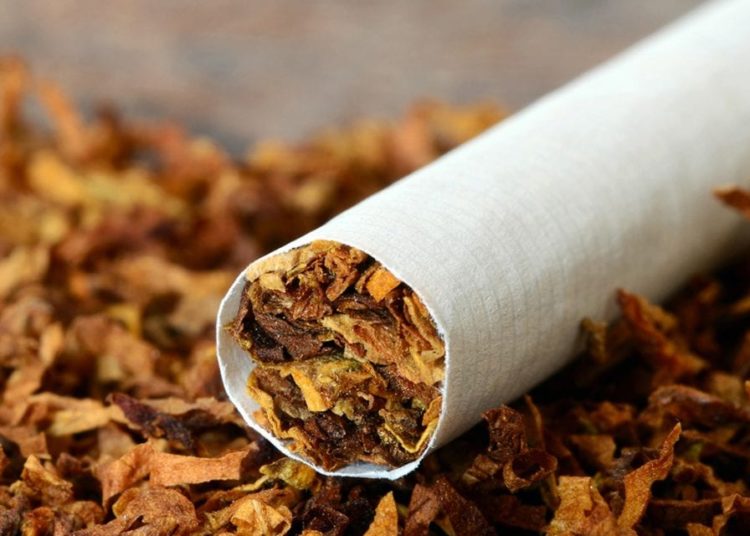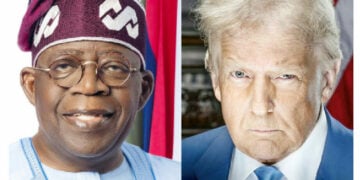Ten years after signing the National Tobacco Control Act, the federal government has yet to implement the law.
The law, which was assented to by former President Goodluck Jonathan in 2015, was intended to reduce tobacco consumption and shield the public, especially the youths, from the health hazards of smoking.
This inaction on the legislation has made Nigerians to still pay dearly for the consequences of tobacco use.
LEADERSHIP Sunday checks revealed that the pungent smell of cigarette smoke still fills the air at motor parks, restaurants and bars in major cities across Nigeria.
Tobacco Control: CAPPA Urges Stronger Enforcement To Save 26,800 Lives
Street kiosks still openly sell single sticks of cigarettes, even to minors. And although the law expressly prohibits smoking in public spaces, there is no enforcement of this provision.
The Act restricts smoking to designated areas, bans tobacco advertising, prohibits sales near schools and prohibits the sale of single sticks of cigarettes.
It also regulates emerging products such as e-cigarettes and vapes, while implementing graphic health warnings to deter use.
According to health experts, the dangers of tobacco go far beyond the smoker. Second-hand smoke affects non-smokers, children, pregnant women, the elderly and continues to be a silent killer in the country’s public spaces.
The World Health Organisation (WHO) affirms that tobacco use damages nearly every organ of the body, contributing to a range of life-threatening illnesses including cancer, heart disease, and respiratory problems.
A chief consultant pulmonologist at the National Hospital Abuja, Dr. Kingsley Osagie, warned about the extensive dangers of smoking, saying its harmful effects begin even before birth and can last a lifetime.
He highlighted the devastating impact of smoking on pregnant women and their unborn babies, explaining that nicotine in cigarettes can impair blood flow to the foetus, leading to smaller birth size, increased risk of asthma, and even miscarriage.
“If the mother is smoking, it also affects the baby in the womb. The baby could be born underweight, may have breathing issues, and is at a higher risk of developing asthma later in life. There is also a high chance of spontaneous miscarriage in women who smoke,” Osagie said.
Beyond the womb, the effects of smoking continue to plague both active and passive smokers. According to Osagie, smoking increases the likelihood of developing chronic respiratory illnesses such as rhinosinusitis, sore throat, asthma attacks, and chronic obstructive pulmonary disease (COPD). It also raises the risk of several types of cancer, including those of the lips, tongue, throat, and lungs.
“Smoke contains over 7,000 chemicals, and at least 250 are known to cause cancer,” he said.
The expert drew attention to smoking’s less obvious impacts, such as damaging the pancreas (which can lead to diabetes) and affecting blood vessels, increasing the risk of hypertension.
Osagie told LEADERSHIP Sunday that secondhand smoke (exposure to smoke from other people) is also dangerous. “Even if you don’t smoke but your partner or friends do, you’re still exposed. The effects might be less, but the risks are real,” he warned.
While acknowledging that quitting smoking is not easy, the pulmonologist encouraged smokers to seek professional help, noting that the benefits of quitting start immediately, regardless of how long one has smoked.
“Any time you stop smoking, the benefits start occurring. It’s never too late to quit,” he said.
On policy, Dr. Osagie criticised the weak enforcement of Nigeria’s anti-tobacco laws. He referenced the National Tobacco Control Act signed by Jonathan in 2015, saying its implementation has been poor due to lack of follow-up legislation and political will.
“There’s already a law, but enforcement is lacking. There was supposed to be a supporting bill from the National Assembly (NASS), but nothing has been done since. The tobacco industry is powerful, and that might be why progress has stalled,” he stated.
He called for designated smoking areas in public places to protect non-smokers and urged the government to step up enforcement to reduce tobacco-related harm across the country.
“People who want to smoke should do so in designated areas. You can’t smoke in public and put others at risk,” he said.
Nigeria, however, still records the consumption of over 20 billion sticks of cigarettes annually. A survey revealed that 5.6 percent of Nigerian adults (about 4.5 million people) use tobacco products, and over 82 per cent of the population is exposed to second-hand smoke when visiting bars and nightclubs.
A study revealed that the country lost an estimated $9.45 billion to tobacco-related illnesses between 2013 and 2020, highlighting the immense economic burden of tobacco use on the nation’s healthcare system and economy.
The research paper titled, “Economic burden of tobacco consumption in Nigeria, 2013–2020: A prevalence-based attributable-risk approach,” was published in Population Medicine in 2023.
It found that the country continues to pay a heavy price as tobacco-related diseases such as stroke, heart disease, and diabetes persist.
The study further showed that of Nigeria’s total health expenditure, a significant portion is consumed by the cost of treating diseases directly linked to tobacco use. Smoked tobacco accounted for the largest share of the burden, with a total cost of $9.37 billion over the eight-year period. Smokeless tobacco added another $749.66 million, bringing the total cost to $9.45 billion.
This financial toll represented about 0.28 per cent of the country’s Gross Domestic Product (GDP) during the period under review.
These statistics reinforce earlier concerns raised by former minister of health, Prof. Isaac Adewole, who cited findings from the Global Adult Tobacco Survey (2012), lamenting the unchecked growth of the tobacco industry.
“The tobacco industry is making huge profits unchecked without taking responsibility for the harm that tobacco does to public health. Evidence has shown that for every $1 gain from the tobacco business, about $3 is expended on healthcare cost as a result of tobacco’s ill effects,” Adewole said.
In Abuja and other cities, cigarette vendors operate with impunity, often targeting the youth and low-income earners with cheap single-stick sales. This defiance of the law has drawn sharp criticisms from civil society groups like the National Tobacco Control Alliance (NTCA) and the Corporate Accountability and Public Participation Africa (CAPPA).
The executive director of CAPPA, Akinbode Oluwafemi, stressed the urgent need for stronger enforcement and legislative will. “The law is clear, but without implementation, it’s just ink on paper,” he said.
He warned of a growing threat posed by new nicotine products such as vapes, e-cigarettes, and nicotine pouches, which are being aggressively marketed to youth under the guise of being ‘safer alternatives.’ Oluwafemi urged lawmakers to include these products in all advertising bans and raise the buffer zone around schools from 30 to 100 metres, aligning with the 2018 Senate Resolution.
One of the biggest hurdles to full implementation, advocates say, is the persistent interference of the tobacco industry. According to Oluwafemi, the industry uses strategic lobbying, marketing, and subtle influence to water down proposed amendments and sidestep accountability. “This interference not only undermines current laws but makes future regulation even more difficult,” he said.
According to CAPPA, despite the approval of new graphic health warnings on tobacco products in June 2023, market surveys in FCT, Ebonyi, Akwa Ibom, and other states reveal widespread non-compliance. Many tobacco products still carry outdated warnings or none at all, even though the 150-day grace period ended in November 2023.
The programme manager of NTCA, Nwokorie Chibuike, said there has not really been any effective implementation of the law, stating that the country has made some gains, but more needs to be done.
According to him, more than 28,000 people die annually in Nigeria due to tobacco consumption. He called on the government to increase the funding for tobacco control to effectively control the menace of tobacco in the country.
Chibuike urged the government to increase the funding for tobacco control to effectively control the menace of tobacco in the country.





